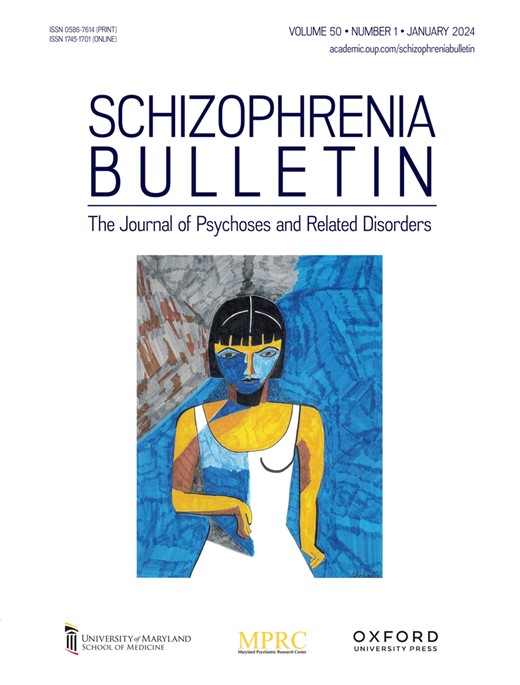Antipsychotic Discontinuation and Re-initiation in Pregnant Women With Schizophrenia: A Retrospective Cohort Study From South Korea
IF 5.3
1区 医学
Q1 PSYCHIATRY
引用次数: 0
Abstract
Background and Hypothesis Pregnant women with schizophrenia are more likely to discontinue treatment, which could trigger a relapse of symptoms. However, data on patterns and risk factors related to antipsychotic discontinuation and re-initiation in Asian pregnant women are insufficient. Study Design We conducted a retrospective cohort study using a nationwide Korean database. The pregnancy group included women who had received antipsychotics before pregnancy and was matched 1:2 with a non-pregnancy group. Using Kaplan–Meier curves, we assessed discontinuation patterns during pregnancy and re-initiation patterns among those who discontinued treatment within the first trimester. A Cox proportional hazards regression analysis was used to examine factors associated with first-trimester discontinuation and re-initiation among those who discontinued during this period. Study Results Pregnant women (n = 2066) had a significantly higher risk of discontinuation than did non-pregnant women (adjusted hazard ratio 3.09; 95% confidence interval 2.85–3.34). Within the first trimester, 67.5% of pregnant women (n = 1394) discontinued antipsychotic use. Women aged 25–29 years were more likely to discontinue (1.25; 1.07–1.47). Among first-trimester discontinuers, 35.2% (n = 491) re-initiated treatment before delivery. A longer duration of antipsychotic use (1.60; 1.06–2.42) and higher daily doses (2.47; 1.76–3.45) were associated with re-initiation of antipsychotics. Conclusions We revealed that most pregnant women discontinued schizophrenia treatment, but those using higher cumulative doses had a higher likelihood of re-initiation. Our findings imply that treatment decisions for pregnant women should consider various clinical factors, including the history of prescriptions and obstetric characteristics. Moreover, these patients require close monitoring after discontinuation.韩国一项回顾性队列研究:精神分裂症孕妇的抗精神病药物停药和重新服用
背景与假设患有精神分裂症的孕妇更有可能停止治疗,这可能引发症状复发。然而,关于亚洲孕妇抗精神病药物停药和重新服用相关的模式和风险因素的数据是不足的。研究设计我们使用韩国全国数据库进行了一项回顾性队列研究。妊娠组包括妊娠前接受过抗精神病药物治疗的妇女,与未妊娠组的比例为1:2。使用Kaplan-Meier曲线,我们评估了在妊娠早期停止治疗的患者在妊娠期间的停药模式和重新开始治疗的模式。Cox比例风险回归分析用于检查在此期间停止妊娠的患者中与妊娠早期停止妊娠和重新开始妊娠相关的因素。研究结果:孕妇(n = 2066)的停药风险明显高于非孕妇(调整风险比3.09;95%置信区间2.85-3.34)。在妊娠早期,67.5%的孕妇(n = 1394)停止使用抗精神病药物。25-29岁的女性更有可能停止服用(1.25;1.07 - -1.47)。在妊娠早期停止治疗的患者中,35.2% (n = 491)在分娩前重新开始治疗。抗精神病药物使用时间较长(1.60;1.06-2.42)和更高的日剂量(2.47;1.76-3.45)与再次服用抗精神病药物有关。结论:我们发现大多数孕妇停止了精神分裂症治疗,但那些使用较高累积剂量的孕妇重新开始治疗的可能性更高。我们的研究结果表明,孕妇的治疗决策应考虑各种临床因素,包括处方史和产科特征。此外,这些患者停药后需要密切监测。
本文章由计算机程序翻译,如有差异,请以英文原文为准。
求助全文
约1分钟内获得全文
求助全文
来源期刊

Schizophrenia Bulletin
医学-精神病学
CiteScore
11.40
自引率
6.10%
发文量
163
审稿时长
4-8 weeks
期刊介绍:
Schizophrenia Bulletin seeks to review recent developments and empirically based hypotheses regarding the etiology and treatment of schizophrenia. We view the field as broad and deep, and will publish new knowledge ranging from the molecular basis to social and cultural factors. We will give new emphasis to translational reports which simultaneously highlight basic neurobiological mechanisms and clinical manifestations. Some of the Bulletin content is invited as special features or manuscripts organized as a theme by special guest editors. Most pages of the Bulletin are devoted to unsolicited manuscripts of high quality that report original data or where we can provide a special venue for a major study or workshop report. Supplement issues are sometimes provided for manuscripts reporting from a recent conference.
 求助内容:
求助内容: 应助结果提醒方式:
应助结果提醒方式:


